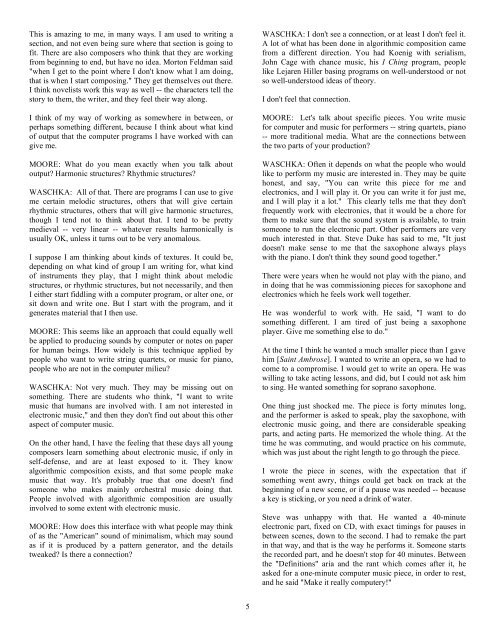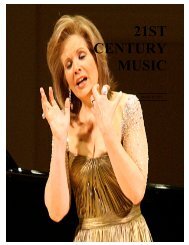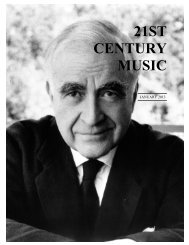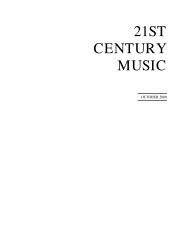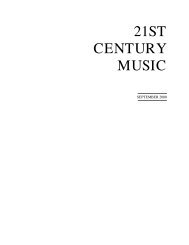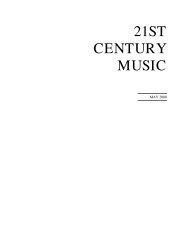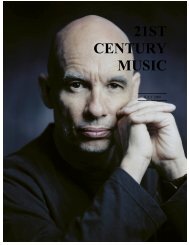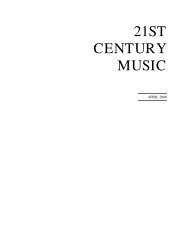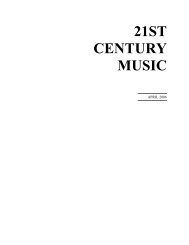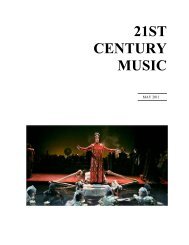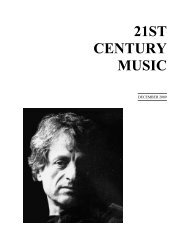Interview with Rodney Waschka II - 21st Century Music
Interview with Rodney Waschka II - 21st Century Music
Interview with Rodney Waschka II - 21st Century Music
Create successful ePaper yourself
Turn your PDF publications into a flip-book with our unique Google optimized e-Paper software.
This is amazing to me, in many ways. I am used to writing asection, and not even being sure where that section is going tofit. There are also composers who think that they are workingfrom beginning to end, but have no idea. Morton Feldman said"when I get to the point where I don't know what I am doing,that is when I start composing." They get themselves out there.I think novelists work this way as well -- the characters tell thestory to them, the writer, and they feel their way along.I think of my way of working as somewhere in between, orperhaps something different, because I think about what kindof output that the computer programs I have worked <strong>with</strong> cangive me.MOORE: What do you mean exactly when you talk aboutoutput? Harmonic structures? Rhythmic structures?WASCHKA: All of that. There are programs I can use to giveme certain melodic structures, others that will give certainrhythmic structures, others that will give harmonic structures,though I tend not to think about that. I tend to be prettymedieval -- very linear -- whatever results harmonically isusually OK, unless it turns out to be very anomalous.I suppose I am thinking about kinds of textures. It could be,depending on what kind of group I am writing for, what kindof instruments they play, that I might think about melodicstructures, or rhythmic structures, but not necessarily, and thenI either start fiddling <strong>with</strong> a computer program, or alter one, orsit down and write one. But I start <strong>with</strong> the program, and itgenerates material that I then use.MOORE: This seems like an approach that could equally wellbe applied to producing sounds by computer or notes on paperfor human beings. How widely is this technique applied bypeople who want to write string quartets, or music for piano,people who are not in the computer milieu?WASCHKA: Not very much. They may be missing out onsomething. There are students who think, "I want to writemusic that humans are involved <strong>with</strong>. I am not interested inelectronic music," and then they don't find out about this otheraspect of computer music.On the other hand, I have the feeling that these days all youngcomposers learn something about electronic music, if only inself-defense, and are at least exposed to it. They knowalgorithmic composition exists, and that some people makemusic that way. It's probably true that one doesn't findsomeone who makes mainly orchestral music doing that.People involved <strong>with</strong> algorithmic composition are usuallyinvolved to some extent <strong>with</strong> electronic music.MOORE: How does this interface <strong>with</strong> what people may thinkof as the "American" sound of minimalism, which may soundas if it is produced by a pattern generator, and the detailstweaked? Is there a connection?WASCHKA: I don't see a connection, or at least I don't feel it.A lot of what has been done in algorithmic composition camefrom a different direction. You had Koenig <strong>with</strong> serialism,John Cage <strong>with</strong> chance music, his I Ching program, peoplelike Lejaren Hiller basing programs on well-understood or notso well-understood ideas of theory.I don't feel that connection.MOORE: Let's talk about specific pieces. You write musicfor computer and music for performers -- string quartets, piano-- more traditional media. What are the connections betweenthe two parts of your production?WASCHKA: Often it depends on what the people who wouldlike to perform my music are interested in. They may be quitehonest, and say, "You can write this piece for me andelectronics, and I will play it. Or you can write it for just me,and I will play it a lot." This clearly tells me that they don'tfrequently work <strong>with</strong> electronics, that it would be a chore forthem to make sure that the sound system is available, to trainsomeone to run the electronic part. Other performers are verymuch interested in that. Steve Duke has said to me, "It justdoesn't make sense to me that the saxophone always plays<strong>with</strong> the piano. I don't think they sound good together."There were years when he would not play <strong>with</strong> the piano, andin doing that he was commissioning pieces for saxophone andelectronics which he feels work well together.He was wonderful to work <strong>with</strong>. He said, "I want to dosomething different. I am tired of just being a saxophoneplayer. Give me something else to do."At the time I think he wanted a much smaller piece than I gavehim [Saint Ambrose]. I wanted to write an opera, so we had tocome to a compromise. I would get to write an opera. He waswilling to take acting lessons, and did, but I could not ask himto sing. He wanted something for soprano saxophone.One thing just shocked me. The piece is forty minutes long,and the performer is asked to speak, play the saxophone, <strong>with</strong>electronic music going, and there are considerable speakingparts, and acting parts. He memorized the whole thing. At thetime he was commuting, and would practice on his commute,which was just about the right length to go through the piece.I wrote the piece in scenes, <strong>with</strong> the expectation that ifsomething went awry, things could get back on track at thebeginning of a new scene, or if a pause was needed -- becausea key is sticking, or you need a drink of water.Steve was unhappy <strong>with</strong> that. He wanted a 40-minuteelectronic part, fixed on CD, <strong>with</strong> exact timings for pauses inbetween scenes, down to the second. I had to remake the partin that way, and that is the way he performs it. Someone startsthe recorded part, and he doesn't stop for 40 minutes. Betweenthe "Definitions" aria and the rant which comes after it, heasked for a one-minute computer music piece, in order to rest,and he said "Make it really computery!"5


